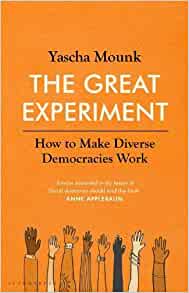An optimistic book about the future of liberal democracies – surely not? But yes, that’s what Yascha Mounk has delivered with The Great Experiment: How to Make Diverse Democracies Work. It’s a book of three parts, the first of which is all about why diverse societies generally fail, starting with the innate human tendency to divide into us and them.
After this gloomy start, which is what we now expect from books about democracy, Mounk notes that this is too bad as most OECD (and other) countries now have diverse populations, and despite populism it is hard to conceive that going back to the more homogenous mid-20th century is possible. So the book goes on in the second part to set out a vision of what a diverse liberal democracy might look like. It argues strongly for “the core commitment of philosophical liberalism,” namely that the state has a responsibility to respect the moral autonomy of its citizens, which means setting limits to its own authority and also protecting individuals from the “cage of norms”, restrictions on autonomy set by their own religious or ethnic group. It also advocates for cultural patriotism, rather than nationalism or the civic patriotism of shared values. I like this alternative very much – it seems to me we are brought together by language, landscape, tv shows, sport, the way buildings and shops look etc. I’d add humour, very distinctive between different countries.
The final part starts with “reasons for optimism” – one of which is that actually, most of the diverse democracies are slowly making progress toward better integration, accepting that people have diverse and multiple identities. The book also argues that optimism is important because it will affect actions and outcomes. It acknowledges what it terms the ‘Chapter 10 problem’ – the generally unsatisfying list of policies at the end of a book, as demanded by publishers and indeed readers. It doesn’t really provide this so much as a few general reflections, concluding: “Constructing diverse democracies that command the enthusiastic support of the great majority of their citzens is going to be hard.” But what choice do we have other than to try? The Great Experiment is already well under way.
So I liked the upbeat message. I don’t think there’s much that’s new here for readers of the death of democracy genre, but the arrangement of the argument into an optimistic outlook is very welcome.

